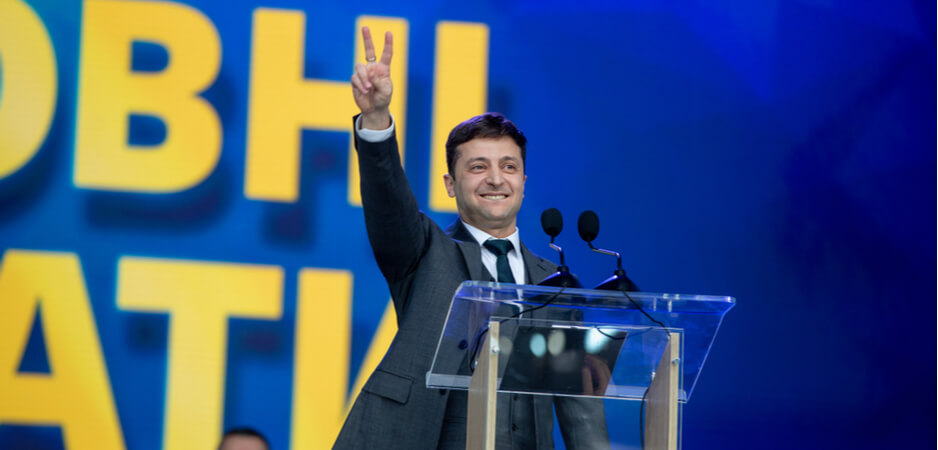The election of an inexperienced politician to Ukraine’s highest office should be taken as a signal that the country’s patience is running thin.
On April 21, Ukrainians voted in the final round of the country’s presidential elections. Its result was devastating for the incumbent, President Petro Poroshenko, who ran for his second term in office but only managed to secure less than a quarter of the votes. Yulia Tymoshenko, Ukraine’s former prime minister and second-time presidential hopeful, did not manage to get past the first round. Instead, Ukrainians overwhelmingly elected Volodymyr Zelensky, a 41-year-old actor, who just became the country’s youngest ever — as well as the least experienced — president-elect.
Despite having never held public office or worked in public service, running as the only candidate for a political party that did not exist 18 months ago, Zelensky still managed to win more than 73% of the popular vote. His overwhelming victory is as unconventional as his rise to power: Prior to running for president, Zelensky’s political experience was only a fictional one.
A lawyer by training and comedy writer, director and actor by profession, Zelensky’s track record was limited to playing a president in the highly popular Ukrainian TV series Servant of the People. Zelensky character, Vasyl Petrovych Goloborodko, is a history teacher who is catapulted to the presidency after a video of his anti-corruption rant goes viral. With no previous experience in public service, Goloborodko relies on humor, naivet, and “common guy” knowledge to make sense of his new — and very much unexpected — responsibilities as a head of state.
The fictional character’s efforts at making government work for “the people,” however, are soon met with the harsh political and socio-economic realities of the country, which include the misuse of the law by public servants, the abuse of power by political leaders and a widespread corruption in the public administration. Rather than dissuading him, however, these challenges encourage Goloborodko to make good on his promise of reforming the country.
Stranger than Fiction
The fact that fictional Goloborodko’s and real-life Zelensky’s careers are so successful, despite their lack of experience, tells a lot about the disenchantment that Ukrainians feel about politics. More than five years after the Euromaidan revolution in February 2014, change in the country’s political system and institutions has been snail-paced. Since the uprising ousted the pro-Moscow president, Viktor Yanukovych, Ukraine has been slowly pursuing a series of constitutional reforms, mainly aimed at curbing presidential powers, strengthening the role of the country’s parliament, the Verkhovna Rada, and increasing the overall efficiency of the state.
According to some analysts, the undertaking of the reforms that Euromaidan — also called the “Revolution of Dignity” — protesters sought did in fact start in 2016, but slowed down soon after. Some of the reasons for the delay include the resistance to changes by oligarchs whose interests are prioritized by the government, the presence of pro-government members on the constitutional court, opposition and conflict within parliament itself, and the continued state of warfare in the country’s eastern Donbas region following the annexation of Crimea by Russia in 2014.
Despite all these challenges, some of the reforms were successful. These included decentralization, the establishment of a public procurement system and making the economy less reliant on bureaucracy. Some of the tangible changes brought about by these reforms include a 2011 decision by parliament to simplify and/or abolish the requirements for the registration and licensing of small businesses. In 2012, the constitutional court, in response to a judicial challenge on whether the setting up of voting stations abroad at Ukraine’ s diplomatic missions was legal, decided to uphold the principles of equal voting right and equal public participation in the elections. Together these measures contributed to increasing the democratic legitimacy of the state.
Other reforms were not as successful. These include land reform, the privatization of large enterprises, the reform of security services and fiscal reform. Regardless of their success, it can be said that ordinary people in Ukraine have not yet felt a significant positive change in government, expressing in a 2017 national survey that “they neither feel the change in the general state of affairs in the country nor on the everyday life level.” The poll, conducted by the Democratic Initiatives Foundation, showed that 42% of the respondents claimed to support government decentralization reform, but only 16% of them indicated that they felt a positive change as a result of its implementation. In contrast, more than half of the respondents (55%) indicated they felt no change at all.
According to the authorities, the main reason for the perception of failure is the time that the reforms will take to deliver visible results. Given that most of them require a long-term approach and changes, their effects will not be seen anytime soon. To determine whether these reforms will be a long-term success — or are already a failure — it is possible to look closer at what is happening in the education and health care sectors.
Health and Education
Firstly, public health financing is ineffective, since funds are paid to medical institutions rather than spent directly on the provision of medical care for patients. Despite the guaranteed free health care, state funding accounts only for half of the total amount of medical expenses. The rest is funded from the pockets of patients, and often such a fee is not officially registered or even considered. Families often complain that it is difficult for them to pay for medication and services.
To make up for these shortcomings, it is not uncommon to bribe medical doctors in order to secure better treatment than that which would be commonly provided. Under this practice, patients or their families encourage the general practitioner in charge to secure better and preferential treatment.
Currently, Ukraine is among the world’s worst countries in terms of equality of access to medical care and is one of five countries that do not have a specific policy aimed at providing access to medical services for children. For instance, according to The Lancet‘s Healthcare Access and Quality Index, Ukraine ranks second to last among Central and Eastern European countries, with only Russia scoring below. This is why health care reform is probably the one with the highest priority among them all.
Secondly, but not less importantly, the education reform’s implementation is of crucial importance to the country. The new law, which the Ministry of Education deputies and experts have been preparing for almost three years, will supersede the one that has been in force since 1991. The government has committed to at least 7% of GDP to be allocated for education every year from now on; comparatively, in 2016, this figure was about 5%. Although by Western European standards the amount allocated to education is substantial, these financial resources will only be sufficient to implement educational reform if the use of resources remains under continued scrutiny.
Moreover, one of the main changes brought about by the reform is the return to a 12-year education system, which prevails in other countries. Although by 1999 Ukraine had already switched to 12-year education, in 2010 the Ministry of Education implemented a return to the 11-year system. Now, the ministry is doing yet another U-turn as new teaching methods could not be “squeezed” into 11 years of study. This newest extension will enable schools to increase the duration of vocational training for one year, hence launching a full-fledged senior specialized school model, which will be closer to the Western European education models.
A Case for the Inexperienced
By other countries’ standards, the Ukrainian political system is a tricky one. It can be argued that, although the majority of the Ukrainian population is eager for change, various sectors of it are neither ready for, nor willing to pursue, such changes. Depending on which reform one talks about, opposition comes from either the rural communities, the older generations or even individuals involved in the so-called shadow economy. The question regarding whether the implementation of these reforms will be successful remains therefore an open one.
The high levels of corruption prevalent in almost all sectors of the economy, the post-Soviet mentality and nostalgia held in certain strata of society, and the economic challenges involved in the redistribution and reallocation of material and human resources are still some of the major obstacles to the implementation of reforms in Ukraine. However, for various other groups and the younger generation, the immediate implementation of such reforms is crucial. Should the reforms slow down further or stop, they could bring back the dynamics of corruption that prevailed in previous decades.
The election of an inexperienced politician to Ukraine’s highest office should be taken as a signal that the country’s patience is running thin. All things considered, real-life Volodymyr Zelensky’s political career and party might have emerged from a televised political satire. But his fictional alter ego still provides wise advice for the president-elect: “Stop it. You laughed, I laughed, we all had some fun. [But] a common guy can’t become president in our country.” Until he did.
The views expressed in this article are the author’s own and do not necessarily reflect Fair Observer’s editorial policy.
Support Fair Observer
We rely on your support for our independence, diversity and quality.
For more than 10 years, Fair Observer has been free, fair and independent. No billionaire owns us, no advertisers control us. We are a reader-supported nonprofit. Unlike many other publications, we keep our content free for readers regardless of where they live or whether they can afford to pay. We have no paywalls and no ads.
In the post-truth era of fake news, echo chambers and filter bubbles, we publish a plurality of perspectives from around the world. Anyone can publish with us, but everyone goes through a rigorous editorial process. So, you get fact-checked, well-reasoned content instead of noise.
We publish 2,500+ voices from 90+ countries. We also conduct education and training programs
on subjects ranging from digital media and journalism to writing and critical thinking. This
doesn’t come cheap. Servers, editors, trainers and web developers cost
money.
Please consider supporting us on a regular basis as a recurring donor or a
sustaining member.
Will you support FO’s journalism?
We rely on your support for our independence, diversity and quality.







